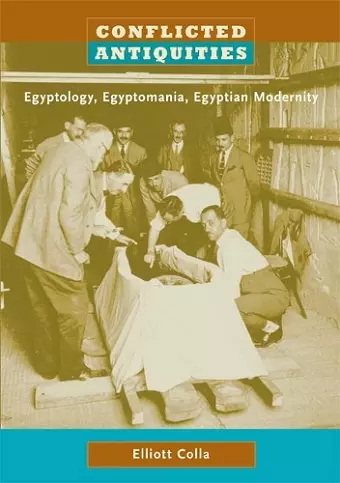Conflicted Antiquities
Egyptology, Egyptomania, Egyptian Modernity
Format:Paperback
Publisher:Duke University Press
Published:11th Jan '08
Should be back in stock very soon

A cultural and political history of the struggle for physical and moral ownership of Egyptian antiquities.
A cultural history of European and Egyptian interest in ancient Egypt and its material culture, from the early nineteenth century until the mid-twentieth.Conflicted Antiquities is a rich cultural history of European and Egyptian interest in ancient Egypt and its material culture, from the early nineteenth century until the mid-twentieth. Consulting the relevant Arabic archives, Elliott Colla demonstrates that the emergence of Egyptology-the study of ancient Egypt and its material legacy-was as consequential for modern Egyptians as it was for Europeans. The values and practices introduced by the new science of archaeology played a key role in the formation of a new colonial regime in Egypt. This fact was not lost on Egyptian nationalists, who challenged colonial archaeologists with the claim that they were the direct heirs of the Pharaohs, and therefore the rightful owners and administrators of ancient Egypt’s historical sites and artifacts. As this dispute developed, nationalists invented the political and expressive culture of “Pharaonism”-Egypt’s response to Europe’s Egyptomania. In the process, a significant body of modern, Pharaonist poetry, sculpture, architecture, and film was created by artists and authors who looked to the ancient past for inspiration.
Colla draws on medieval and modern Arabic poetry, novels, and travel accounts; British and French travel writing; the history of archaeology; and the history of European and Egyptian museums and exhibits. The struggle over the ownership of Pharaonic Egypt did not simply pit Egyptian nationalists against European colonial administrators. Egyptian elites found arguments about the appreciation and preservation of ancient objects useful for exerting new forms of control over rural populations and for mobilizing new political parties. Finally, just as the political and expressive culture of Pharaonism proved critical to the formation of new concepts of nationalist identity, it also fueled Islamist opposition to the Egyptian state.
“Conflicted Antiquities is superb, the definitive work on the place of ancient Egypt in the imaginations and politics of Europe and Egypt. Elliott Colla presents translations and analyses of Arabic literature not previously available, and he brings together for the first time European and modern Egyptian appropriations of and discourses on ancient Egypt. The range of materials that he analyzes is astounding and rich; the footnotes alone are worth the price of the book.” - Lila Abu-Lughod, author of Dramas of Nationhood: The Politics of Television in Egypt “Written in an engaging, thoughtful, and provocative style, Conflicted Antiquities provides a unique perspective on the ‘consumption’ of ancient Egypt. What makes it distinctive is Elliott Colla’s focus on Egyptian readings of the ancient past, an area which has been greatly neglected. Colla has much that is fresh and new to contribute, especially since the resources on which he draws are not widely known nor easy to get hold of.”- Stephanie Moser, author of Wondrous Curiosities: Ancient Egypt at the British Museum “Conflicted Antiquities presents an exhaustively researched and sharply written account of how Egyptian Pharaonic monuments, the sites and buildings that house them, and the personnel who have worked to uncover and care for them have acquired and changed meaning over the course of the 19th and 20th centuries. . . . Anyone who picks up Conflicting Antiquities will come away from its reading with a more complete understanding of the relationship between science and colonialism, of the politics inherent to modern tourism, and of the power of the ancients to shape the governing practices of the present. In every case, readers will be delighted by Colla’s prose, impressed with his erudition, and engaged by the connections he forges between the appropriated past and the contested present.” - Lisa Pollard (International Journal of Middle East Studies)
ISBN: 9780822339922
Dimensions: unknown
Weight: 481g
360 pages